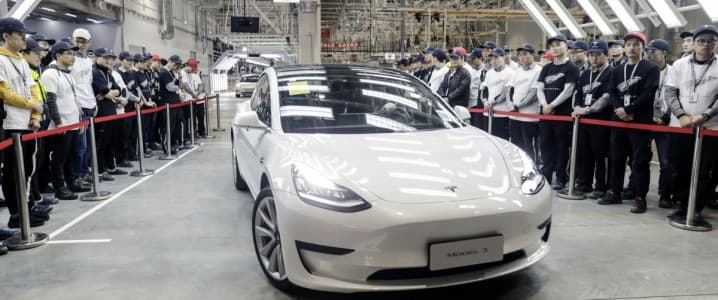
This is sequentially lower than the company's 59,845 vehicles sold in January, investors had widely expected a slight decline in numbers. Year over year, the numbers are impressive, but the comps still reflect a slowdown in production due to the ongoing Covid pandemic.
In February 2021, Tesla sold 18,318 vehicles out of its Shanghai plant.
Of the vehicles it produced, about 33,000 were exported to Europe and 23,000 were sold domestically in China. "Tesla typically exports more of its Shanghai production early in a quarter and sells more in China later in a quarter," Barron's noted on Tuesday morning.
Barron's also noted that Tesla will have to play catch-up for the rest of the year if it hopes to meet its projected guidance of between 800,000 and 900,000 Chinese deliveries for the full year.
Recall, for January, Tesla sales fell -15.5% as the company dealt with increasing EV competition and higher comps coming out of a record month in December. Recall, Tesla sold 70,602 cars in China during December, marking a 34% sequential rise in sales from November into December.
Elsewhere in the world of EVs for February, Nio delivered 6,131 cars in February, a 9.9% YOY gain. Li Auto and Xpeng delivered 8,414 and 6,225 vehicles, marking growth of 265% and 180% YOY, Reuters reported Tuesday morning.
Overall auto sales in China fell 39.4% sequentially from January to February, the CPCA said.
For 2021, we reported that new energy vehicles stole the show in China, with sales totaling 2.99 million units. 2021 battery electric vehicle sales led the charge, according to Bloomberg, with sales up 168.6% to 2.44 million units for the year. China’s Passenger Car Association said that overall passenger vehicle sales finished the year at 20.5 million units, up 4.5% for the year.
The overall rise in vehicles sales for 2021 in China came after a torrid November, where we noted weeks ago that sales fell for the seventh straight month and were down 9.1% from the year prior as the industry continued to struggle with what is now becoming a years long semiconductor shortage.
CAAM spokesperson Chen Shihua commented earlier this year: "Consumer acceptance of new energy vehicles continues to rise. The market has shifted from policy-motivated to demand-driven."